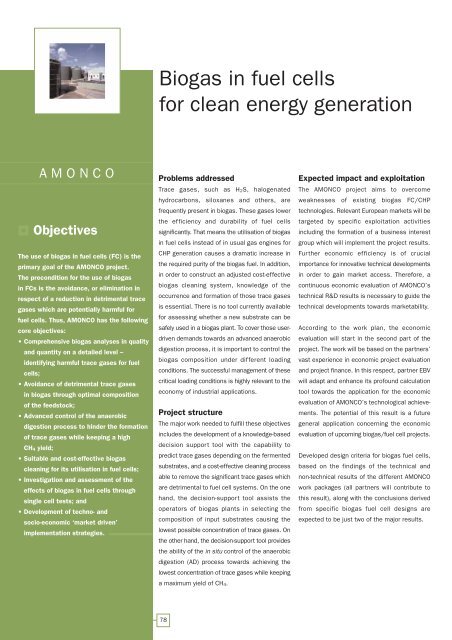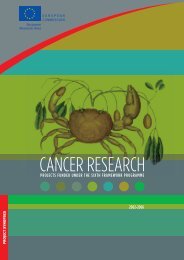European Bio-Energy Projects
European Bio-Energy Projects
European Bio-Energy Projects
Create successful ePaper yourself
Turn your PDF publications into a flip-book with our unique Google optimized e-Paper software.
AMONCO<br />
Objectives<br />
The use of biogas in fuel cells (FC) is the<br />
primary goal of the AMONCO project.<br />
The precondition for the use of biogas<br />
in FCs is the avoidance, or elimination in<br />
respect of a reduction in detrimental trace<br />
gases which are potentially harmful for<br />
fuel cells. Thus, AMONCO has the following<br />
core objectives:<br />
• Comprehensive biogas analyses in quality<br />
and quantity on a detailed level –<br />
identifying harmful trace gases for fuel<br />
cells;<br />
• Avoidance of detrimental trace gases<br />
in biogas through optimal composition<br />
of the feedstock;<br />
• Advanced control of the anaerobic<br />
digestion process to hinder the formation<br />
of trace gases while keeping a high<br />
CH4 yield;<br />
• Suitable and cost-effective biogas<br />
cleaning for its utilisation in fuel cells;<br />
• Investigation and assessment of the<br />
effects of biogas in fuel cells through<br />
single cell tests; and<br />
• Development of techno- and<br />
socio-economic ‘market driven’<br />
implementation strategies.<br />
<strong>Bio</strong>gas in fuel cells<br />
for clean energy generation<br />
Problems addressed<br />
Trace gases, such as H2S, halogenated<br />
hydrocarbons, siloxanes and others, are<br />
frequently present in biogas. These gases lower<br />
the efficiency and durability of fuel cells<br />
significantly. That means the utilisation of biogas<br />
in fuel cells instead of in usual gas engines for<br />
CHP generation causes a dramatic increase in<br />
the required purity of the biogas fuel. In addition,<br />
in order to construct an adjusted cost-effective<br />
biogas cleaning system, knowledge of the<br />
occurrence and formation of those trace gases<br />
is essential. There is no tool currently available<br />
for assessing whether a new substrate can be<br />
safely used in a biogas plant. To cover those userdriven<br />
demands towards an advanced anaerobic<br />
digestion process, it is important to control the<br />
biogas composition under different loading<br />
conditions. The successful management of these<br />
critical loading conditions is highly relevant to the<br />
economy of industrial applications.<br />
Project structure<br />
The major work needed to fulfill these objectives<br />
includes the development of a knowledge-based<br />
decision support tool with the capability to<br />
predict trace gases depending on the fermented<br />
substrates, and a cost-effective cleaning process<br />
able to remove the significant trace gases which<br />
are detrimental to fuel cell systems. On the one<br />
hand, the decision-support tool assists the<br />
operators of biogas plants in selecting the<br />
composition of input substrates causing the<br />
lowest possible concentration of trace gases. On<br />
the other hand, the decision-support tool provides<br />
the ability of the in situ control of the anaerobic<br />
digestion (AD) process towards achieving the<br />
lowest concentration of trace gases while keeping<br />
a maximum yield of CH4.<br />
78<br />
Expected impact and exploitation<br />
The AMONCO project aims to overcome<br />
weaknesses of existing biogas FC/CHP<br />
technologies. Relevant <strong>European</strong> markets will be<br />
targeted by specific exploitation activities<br />
including the formation of a business interest<br />
group which will implement the project results.<br />
Further economic efficiency is of crucial<br />
importance for innovative technical developments<br />
in order to gain market access. Therefore, a<br />
continuous economic evaluation of AMONCO’s<br />
technical R&D results is necessary to guide the<br />
technical developments towards marketability.<br />
According to the work plan, the economic<br />
evaluation will start in the second part of the<br />
project. The work will be based on the partners’<br />
vast experience in economic project evaluation<br />
and project finance. In this respect, partner EBV<br />
will adapt and enhance its profound calculation<br />
tool towards the application for the economic<br />
evaluation of AMONCO’s technological achievements.<br />
The potential of this result is a future<br />
general application concerning the economic<br />
evaluation of upcoming biogas/fuel cell projects.<br />
Developed design criteria for biogas fuel cells,<br />
based on the findings of the technical and<br />
non-technical results of the different AMONCO<br />
work packages (all partners will contribute to<br />
this result), along with the conclusions derived<br />
from specific biogas fuel cell designs are<br />
expected to be just two of the major results.

















